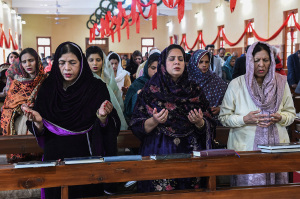How I give back and help women fight abuse

I left him and returned three times. Despite all his attempts at isolation, addiction, threats and verbal and psychological abuse, I felt I needed to show him the care and love of Jesus. “You are Jesus’ hands and feet,” I kept hearing in my head. Yes, people had said this to me.
While he wouldn’t attend church with us and refused anything having to do with God or spirituality — I was able to take the kids to church. As long as it didn’t inconvenience him.
And it was there in the church bathroom where I found myself wondering if I was in an unhealthy relationship, for the first time in many years.
I noticed a tear-off flyer there which listed the warning signs of an abusive relationship. With tears in my eyes, I mentally checked “yes” to the majority of the behaviors listed and ripped off the contact information for the assistance program at ARMS/Abuse Recovery Ministry Services. I didn’t call them right away — in fact, I lost the tab and had to tear off another a few weeks later after a particularly disturbing incident in my home.
I started the program in denial. I was just there to “learn more.” But the lessons did eventually sink in, and that program became a source of healing, helped me set boundaries, taught me healthy responses, enforced my true value, and literally saved my life. I realized I had not been in just one unhealthy relationship — I’d been in three.
Today, I’m not only an abuse survivor, but I’m also a certified advocate and the women’s services director for this same organization, which runs “Her Journey,” a program to help women around the world recover and heal from abuse.
My story of abuse is sadly not unique. Three in ten women are affected by abuse, and these women will on average leave seven times before leaving for good. In my home state of Oregon, the average is actually four in ten. Some men also are abused.
But every woman’s journey to recovery is unique.
Some need housing and help with explaining to their young children why they must leave. Some need help with pursuing a restraining order against their abusive partner. Others may need help getting ready to care for the child they’re expecting. Some need legal expertise and other resources. Many need ongoing support.
Giving women confidence that they have support in navigating the roadblocks they see to leaving is just part of their recovery journey.
The “Her Journey” recovery program works through a series of biblically based lessons on denial, the cycle of abuse, and setting boundaries. Participants discuss anger, depression, our true value, submission vs oppression, relapse prevention and more to help women prevent abuse from recurring in their lives. And we talk about true Christian love compared to what their abuser has and hasn’t done.
Abuse is never God’s plan for anyone’s life. Survivors need to hear that. They need to know that abuse is not normal and that they have so much more value than that. Hearing that message and realizing their true value is what helps survivors find help. Erasing the negative messages that have implanted in their brains over the years is key to finding hope and healing.
While each woman’s journey is different, I’ve seen there are three things every abuse survivor needs to hear:
I believe you. This is not your fault. And you are not alone.
Abuse victims need to hear validation. No matter how charming or esteemed her partner is, believe her. She has undoubtedly tried to share her experience with others before and been met with doubt. She needs to hear that she is believed and that she is worth more than the abuse she is experiencing.
Abusers use fear and blame to make their victims believe the abuse is their fault. Abuse victims have been told by their partner that if they had handled things differently or were better at certain things, circumstances would be different. This is part of the abuser’s tactics to avoid blame for their abusive actions. Abuse is never the survivor’s fault, and it’s crucial for survivors to know that.
It's also crucial for survivors to know they are not alone. Women are in crisis when they reach out, and it’s key that they get connected to their recovery journey as quickly as possible. “Her Journey” programs are available in pregnancy centers, churches and community centers all over the world. The programs are free, survivors can start anytime and attend as often as they need to.
I share my experiences to show women that while abuse may be a part of their story, peace and recovery are possible. A time is ahead when they can focus more on healing versus the hurt. Where they can feel alive again, and maybe even help others. God does not want us to stay in the cycle of abuse — He wants us to live life abundantly.
God led me step-by-step to recovery. I now have a healthy relationship with a husband who treasures and loves me, and I have the immense joy of being a grandmother too. All women are worthy of the same hope, healing, and peace.
Julie Bonn Blank is an abuse survivor, a certified abuse recovery consultant and author/speaker. Learn more at www.juliebonnblank.com and www.abuserecovery.org.




























